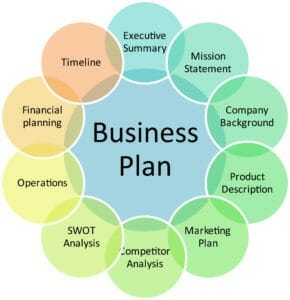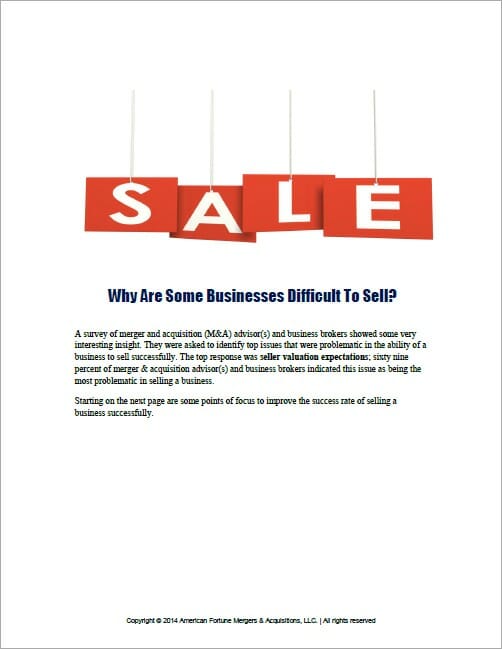
Preparing a Business For Sale
When to sell a business and when to start preparing a business for sale. In a perfect world, the best time to sell a business is when the business is performing well with future projections looking even better, the national economy is strong, and the industry is getting a lot of attention from Wall Street investors. However, regardless of all these factors, an owner might need to sell their business. Health issues, divorce, retirement, etc. all contribute to when a seller needs to put their business on the market. Aside from those things an owner cannot control, there are many actions that one can take to still make in preparing a business for sale and make it as attractive as possible to potential buyers.
PREPARING A BUSINESS FOR SALE & BUILD MARKET VALUE:
- Standardize and document all company processes and procedures
- Eliminate liabilities or liens and resolve any outstanding litigation
- Investigate transferability of leases and sales & supplier contracts
- Perform maintenance on company equipment to ensure good operating condition
- Secure key employees with employment contracts
- Eliminate non-performing or non-contributing employees from payroll
- Establish a management team that can operate without the current owner
- Reduce reliance on one or two large customers for the majority of sales
- Spruce-up the physical aspects of the business facility
- Have clean, verifiable financial statements for the past three years
TO IMPROVE CASH FLOW, CONSIDER THE FOLLOWING ACTIONS:
- Reduce unnecessary inventory
- Collect any outstanding receivables
- Re-negotiate favorable key supply contracts
- Reduce personal adjustments on income statements
- Ensure financial controls are established
Business owners need to be aware of the inherent conflict that arises with running a business and having expertise and time to prepare a business for sale. Many businesses are run with the objective of minimizing tax liabilities. Unfortunately, the same techniques and accounting practices that minimize taxes also minimize the value of a business. It is also very prudent to have a professional adviser to show you how to prepare a business for sale. Ideally, planning the sale of a business should be made one to three years in advance of the anticipated sale. This will allow adequate time to make changes and demonstrate a track record of maximum profits.
In addition to setting a future target for the business sale, a business owner should ask themselves what they want to get out of the sale of their business. Do they just want to finance their retirement? Is it important that their son or daughter remains with the business? Can they gain tax benefits by financing part of the sale price? Do they want to ensure the new owner will treat their customers with the same level of service? Make a list of priorities and seek the advice of business professionals to ensure there are no surprises during the sale process.
Ten Reasons Businesses Do Not Sell a Business
Over the years, countless surveys and studies have been done to learn about the success of selling a business and reasons businesses do not sell. Business owners and business brokers alike have been interviewed and polled to see what works and what doesn’t. All of this has been done under the guise of improving the industry’s long-standing (and dismal) acknowledgement that businesses are tough to sell and the business sale success ratio is not good. In fact, according to the IBBA (International Business Brokers Association), small businesses and retail establishments only successfully sell their businesses 65% of the time. You read that right. Ninety percent of the time, small or retail businesses do not sell!
The good news is that all of these studies and surveys have also discovered that many of the reasons businesses do not sell were preventable. If there were one word of advice from business brokers and mergers and acquisition professionals, it would be PREPARE.
Here are the top 10 reasons businesses do not sell:
- The business is overpriced, in some cases as much as 100% over the appropriate value.
- The business has several family members playing key roles in management.
- The owner is the business. The company cannot effectively run without the efforts of the owner.
- One or two customers make-up more than 25% of the total business.
- The industry in which the business exists is diminishing or threatened by globalization.
- The owner (s) is aging and has slowed down. This results in decreased revenues.
- The owner didn’t take the time to properly form an exit plan. To properly prepare a business for sale, owners should engage a business broker (or adviser) 2-5 years prior to selling.
- Many of the financial rewards of the business were taken by the owner in various “perks” which, from a valuation, banking or market perspective will not make it to the EBIDTA as add backs.
- The seller did not take the time to become educated on the selling process; particularly on the complexity of the buyer’s due diligence process.
- The owner did not hire the proper professionals to help such as a M & A Adviser (as opposed to a business broker that often works both sides in a business sale).
There are other significant factors that can contribute or detract from a seller’s success and reasons businesses do not sell. One relates to how a business attempts to be sold. Many owners advertise the sale of their business through newspapers, industry publications, email blasts, and business for sale web sites. Almost all of these approaches invite individual buyers, which may be just fine, but they minimize the chance the business will be noticed by the vast world of corporate buyers that may be interested. This is a pretty import point. Not only does an owner limit their pool of potential buyers, but they are limiting a large segment of financially qualified buyers. Whereas many individuals buyers might think they have the financing (and it doesn’t pan-out), corporate buyers rarely express interest unless they have the money to express interest.
Other reasons businesses do not sell is a lack of preparation. It takes a lot of planning to maximize the marketability of a business and, quite frankly, few business owners have the time to adequately focus on this. Selling a business not only takes years of preparation, it takes using a proven process. No business owner can keep their business running smoothly while (at the same time) sifting through streams of bargain hunters how may or may not end-up purchasing their business. Without a process and preparation, bargain hunters will chip away at your carefully developed price for the business. After a few years of this, businesses often suffer a significant drop in performance. Key employees can begin to get nervous and, like an overpriced home, the business becomes stale while sitting on the market waiting for the right buyer to come along.
Most of the reasons businesses do not sell are preventable. Selling a business with a business broker (or consultant), do this well in advance of your targeted time to sell. The planning and preparation will pay-off when you successfully sell your business at your maximized asking price.
Sellers Education on Preparing a Business For Sale
Educate, Educate, Educate!!! It’s the best thing a business owner can do when considering selling their business. But merely typing “Preparing a Business For Sale” into your search engine doesn’t necessarily mean you’re returned with quality information that will truly help. How many times have you tried to research something only to find yourself more frustrated and confused than informed? We get it!
The business consultants at Business Sale Advocate keep abreast of all the latest industry information on how to sell a business. Books, articles, publications, blogs, websites, etc. If you can name it, they have read it. This page is dedicated to information that has been reviewed and approved by the Business Sale Advocate team. Below you will find advice, instructions and facts relating to all aspects of selling a business. Peruse at your leisure and, by all means, if you know of a good resource not already listed, please contact us.
Why pay high commissions to business brokers on the sale price of your business. Contact American Fortune Mergers & Acquisitions and experience low prices and superior expertise and support, click here.
We have showed clients American Fortune Mergers & Acquisitions preparing a business for Sale in the following areas of the USA: Columbus Ohio, Atlanta Georgia, Lexington Kentucky, Bowling Green Kentucky, Nashville Tennessee, Memphis Tennessee, Cincinnati Ohio, Dayton Ohio,Toledo Ohio, Los Angeles, Cleveland Ohio, Pittsburgh Pennsylvania, Baltimore, Maryland, Indianapolis Indiana, Chicago Illinois, Detroit Michigan, Flint Michigan, Tampa Florida, St. Louis Missouri, Kansas City Kansas, Des Moines Iowa, Minneapolis Minnesota, Louisville Kentucky, Oklahoma City, Oklahoma, Dallas Texas, Fort Worth Texas, Denver Colorado, San Francisco California, Salt Lake City Utah, Phoenix Arizona, Lexington Kentucky, Los Angeles California, San Diego California. Our corporate offices are located in Los Angeles, California, Louisville, and Kentucky.






